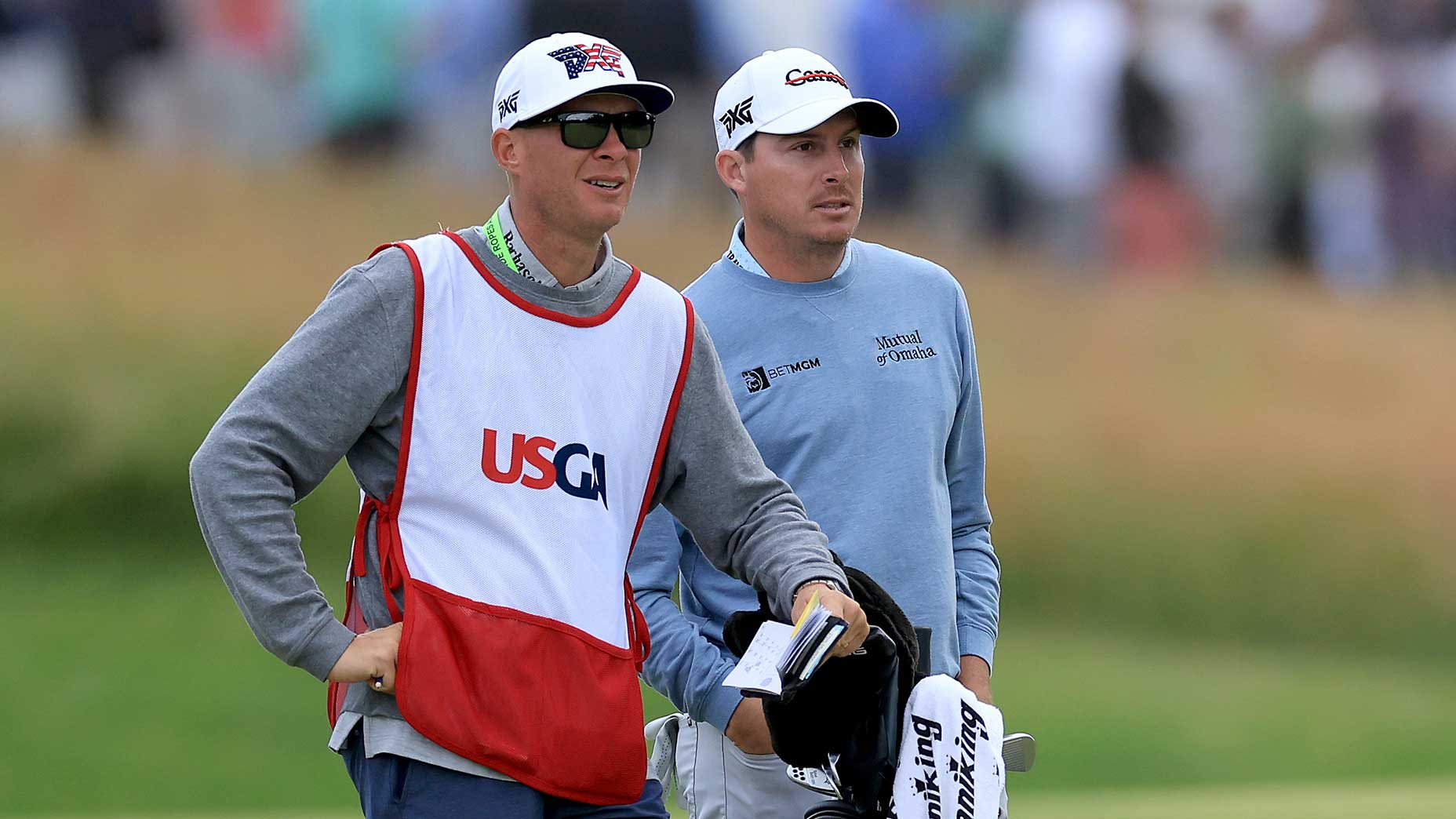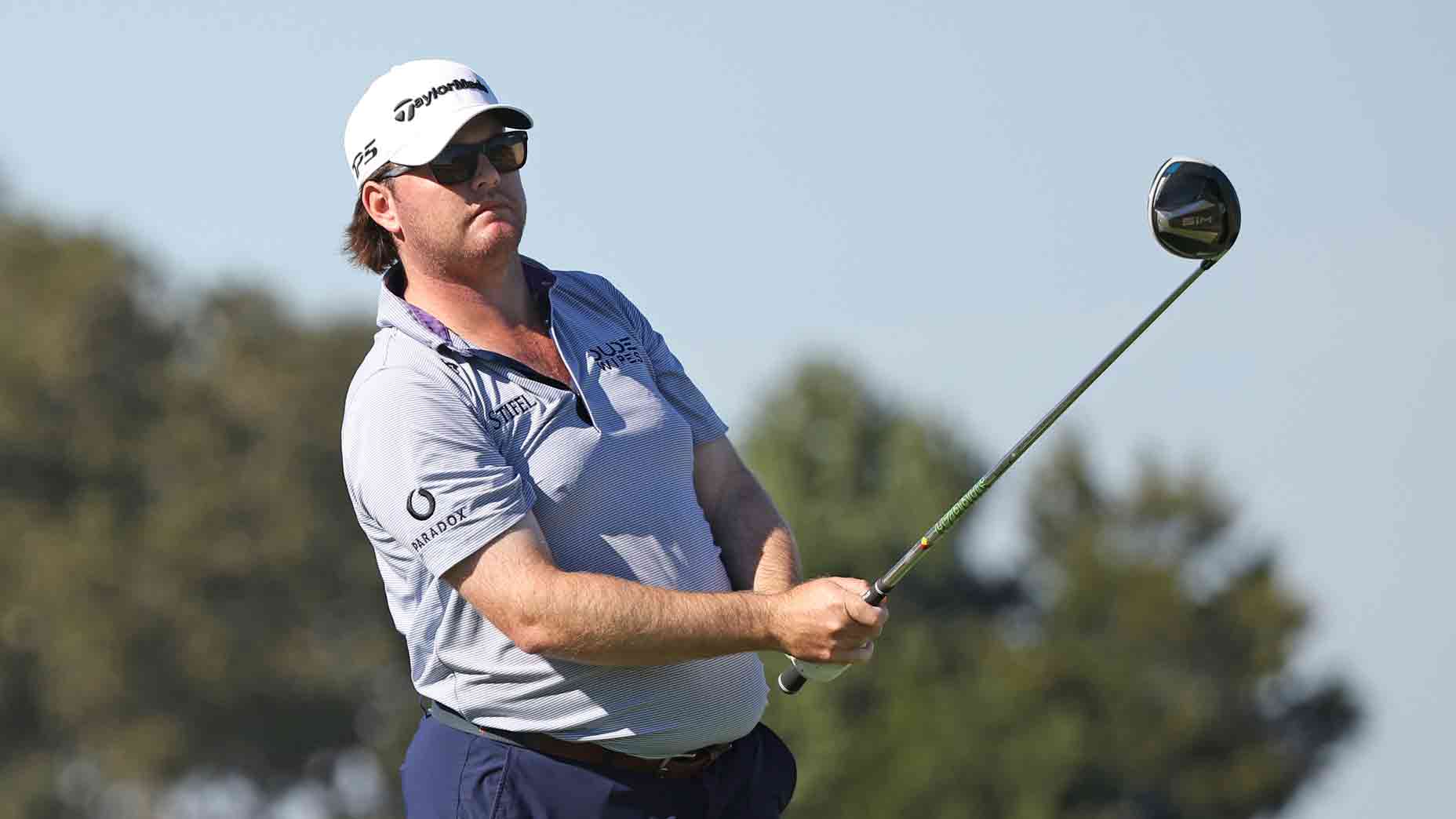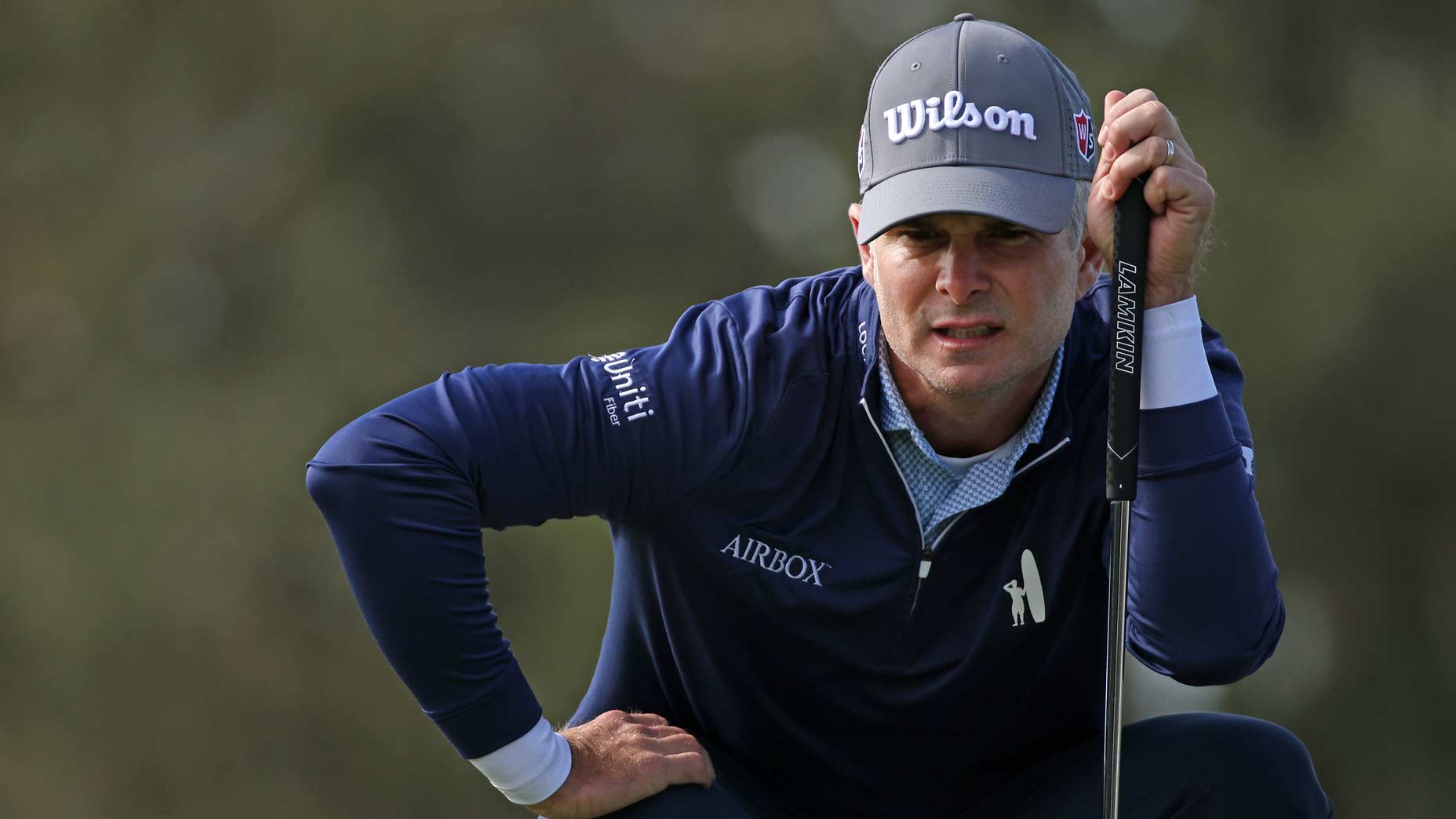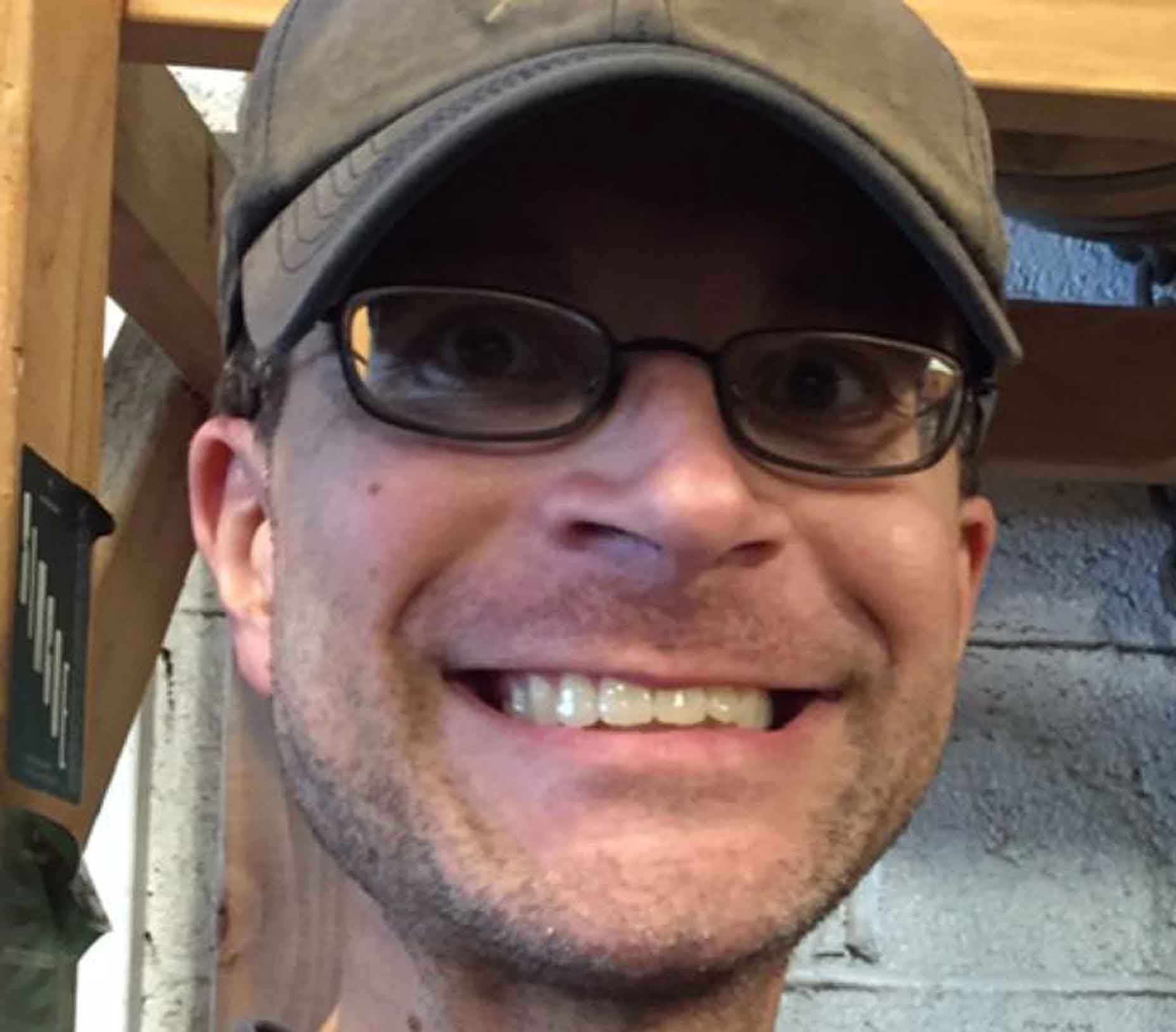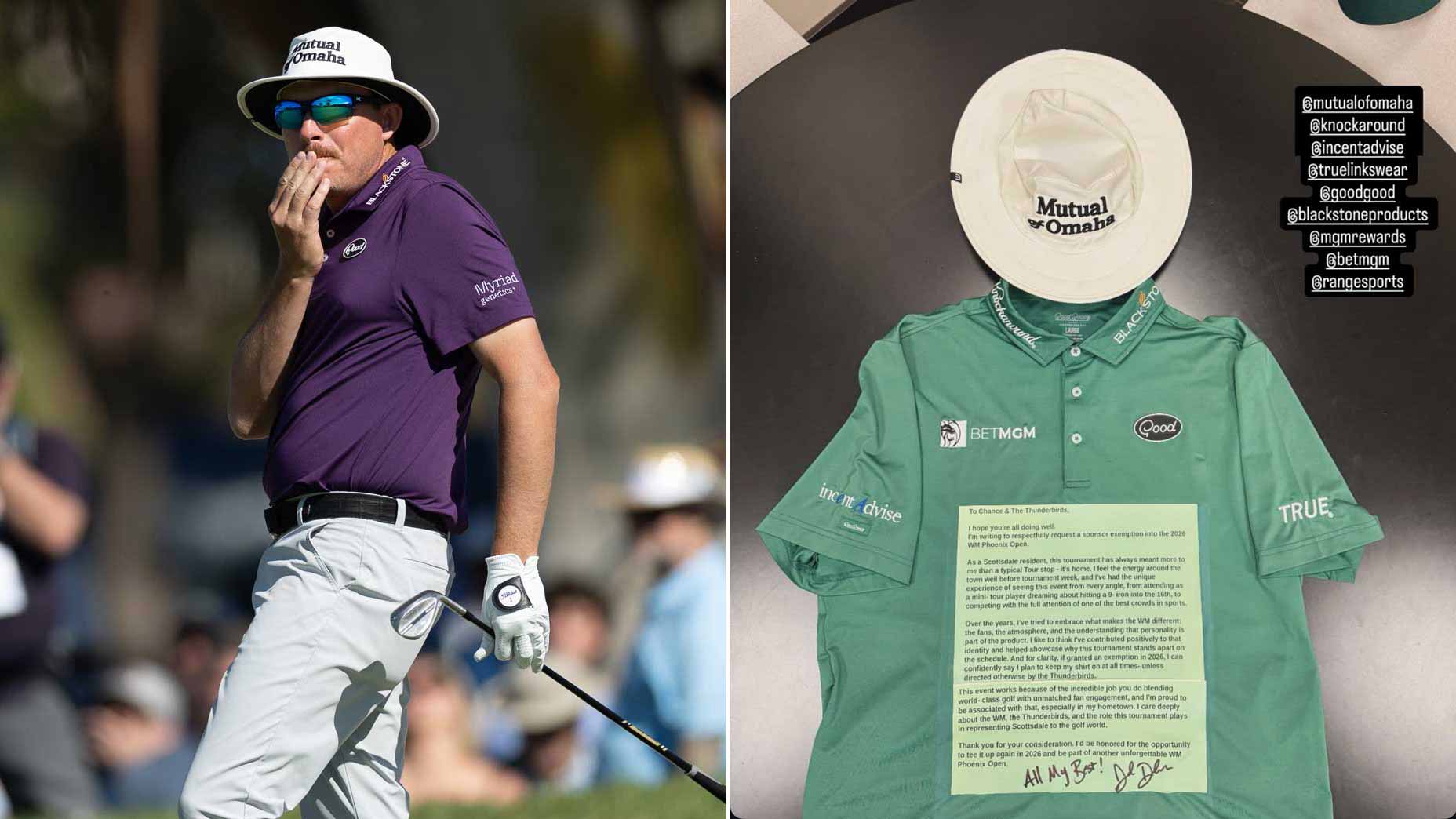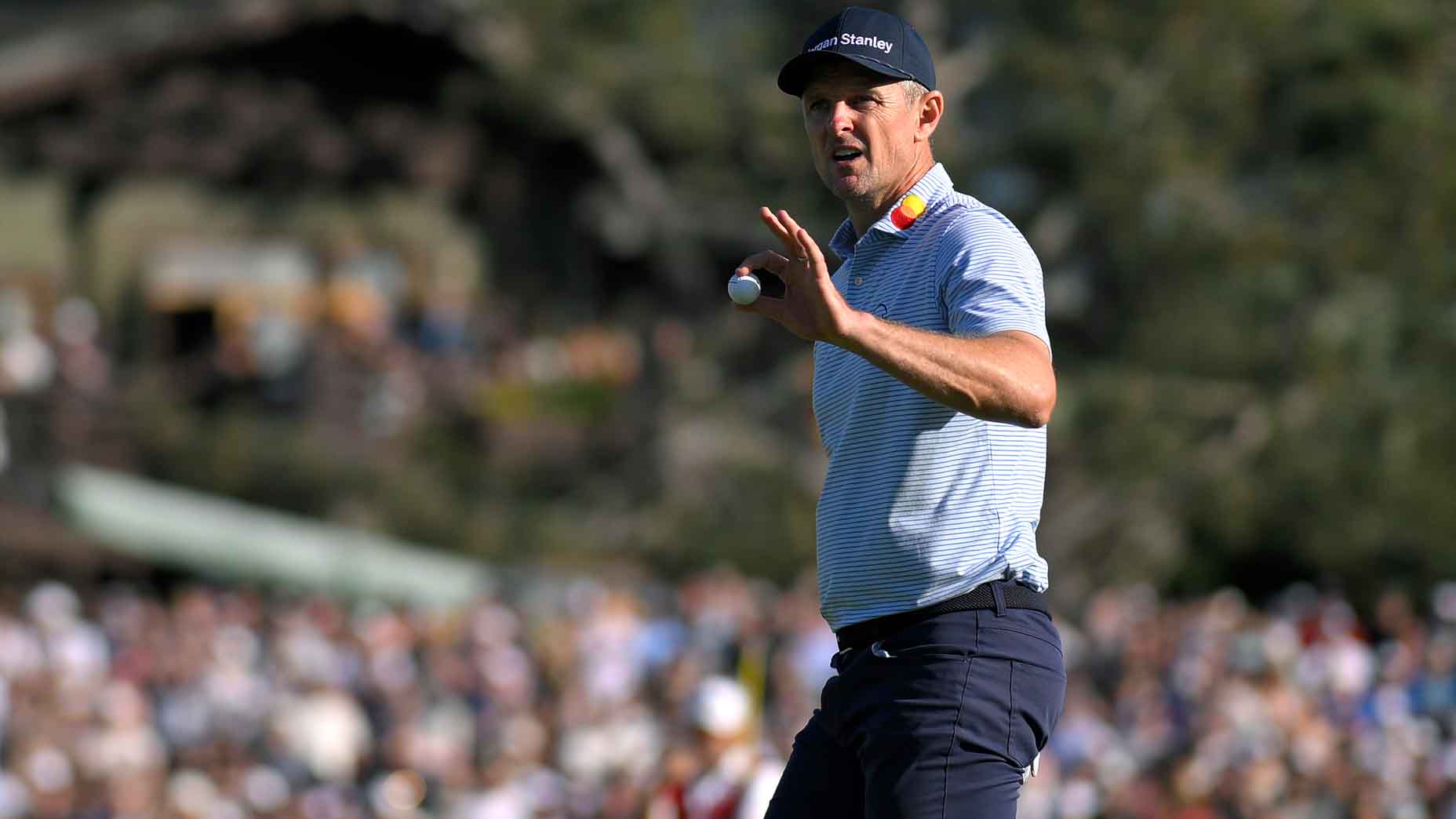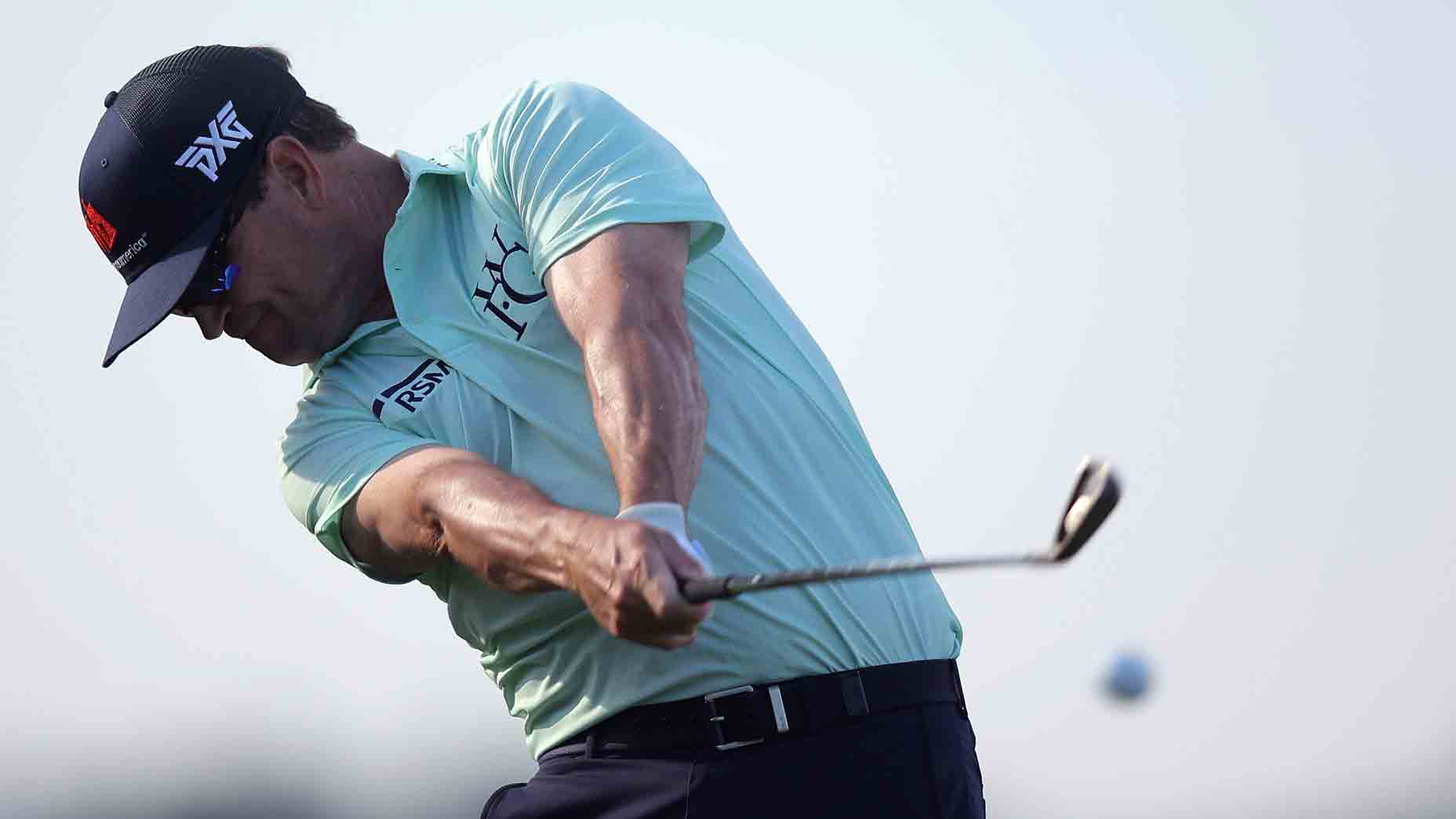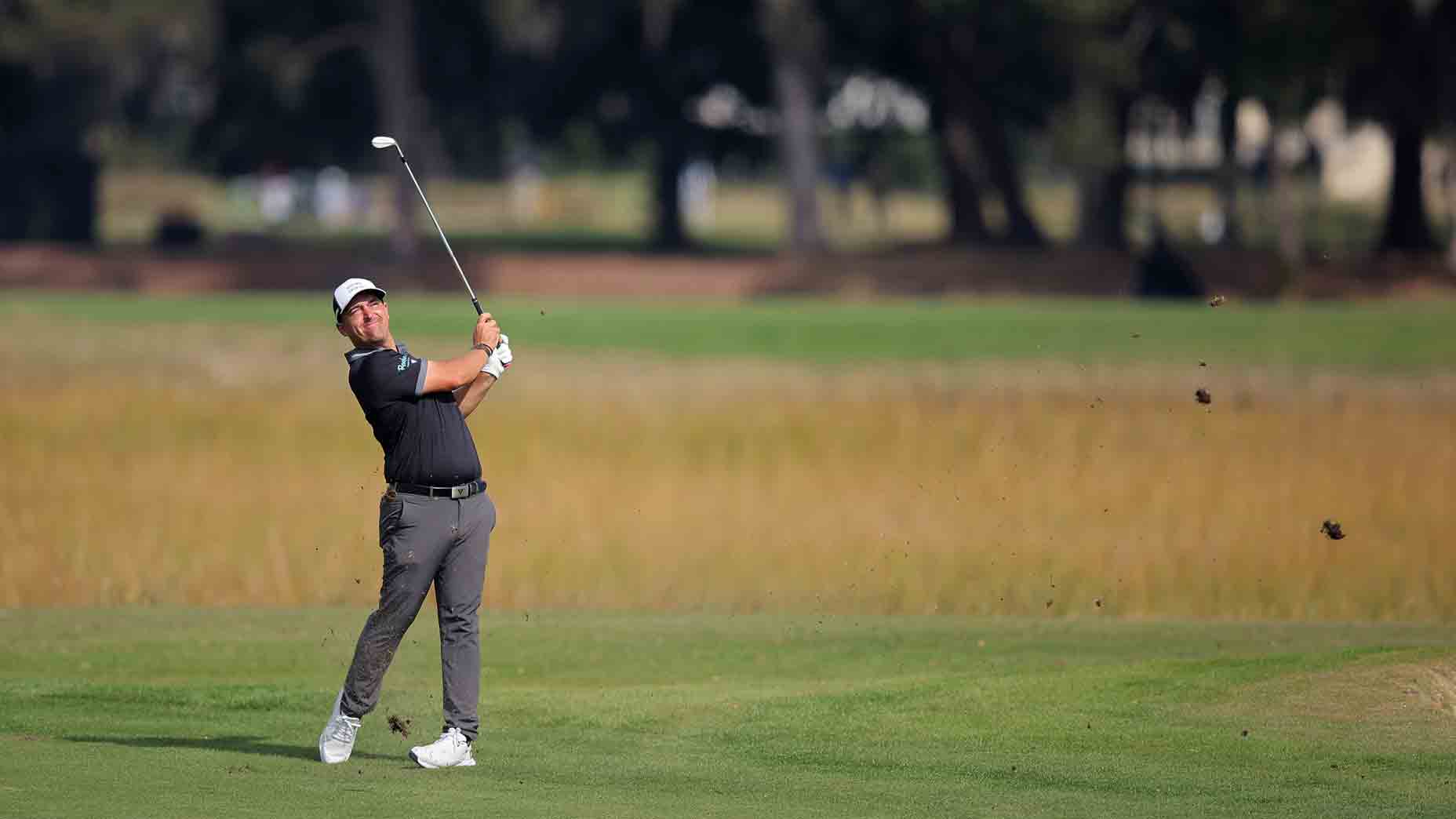Joel Dahmen was in fine form, and he was in good spirits. Then they asked him about his resume.
You know Dahmen well, don’t you? He’s fun. He’s fun on social media. Though his caddie, Geno Bonnalie, is maybe more so. He’s fun off the course. Golf Digest has him on their newest cover in a playful pose. He’s fun on the course. We all remember the shirts-optional moment earlier this year at the Waste Management Phoenix Open. And it was more of the same after Friday’s RSM Classic second round. A reporter asked him for his “most satisfying” part of the day after his 64, and this was a softball.
“Beating Seamus Power,” Dahmen said of his playing partner and fellow 35-year-old.
What did Joel Dahmen learn this week? A lot about himself (and that he’s already in the ’23 U.S. Open)By: Josh Berhow
They’ve known each other for a while, Dahmen explained. After a few more questions, he was then asked if he “felt like that trajectory for both of you now is the best golf of your careers.”
“For sure for him,” Dahmen said.
If you’ve ever wanted a peek into what the pro golf life is really like, the next few minutes from here will tell you. They’re as open as you can get on the subject, though if you like it in a sentence, go back and re-read the first paragraph of this story.
If wins are your marker, you don’t know Dahmen well, do you? He has only one victory, at last year’s Corales Puntacana Resort and Club Championship, and that gives him PGA Tour playing privileges through just the end of this season. And you can laugh all you want at the hijinks, but reality has him damn scared.
“You said on the Fire Pit pod about playing with fear. Is that fear because the winner exemption’s gone, fear that you have a mouth to feed soon?”
“I’ve been playing with fear since forever, since I got my Tour card really,” Dahmen said. “I’m scared to death of having a job. I’ve never really had one. Pretty good spot financially with the family right now, and I just don’t — I mean, I don’t want to give this up. It’s one of the most coveted things in all of sports is a PGA Tour card. Yeah, I just don’t want to give this up.”
“Has that been inspiration all this fall, because you did mention that you are aware it’s the first year that the winner’s exemption is up?”
2022 RSM Classic: TV schedule, tee times, how to watch, streamingBy: Kevin Cunningham
“Yeah, I mean, you’re always anxious,” Dahmen said. “Golf’s hard. Golf is very hard, and it can go sour quickly. To play with freedom for a year and a half, two and a half years really, never had that in my career. So yeah, like teeing up in Napa [the Tour season opener] was like, OK, we’re back at square one. If you don’t play well, you don’t have a job. I was very aware of that, for sure. And maybe, yeah, I don’t think about it necessarily when I’m out there, but there’s been a couple extra days of practice, for sure. I mean, I’ve always kind of played better when my back’s against the wall a little bit, and it’s hard to say your back’s against the wall when you’re starting out a year, but for the first time in a couple years, it was different for me, for sure.”
“Would you call what you have now fear or just maybe an awareness is a better way of saying it?”
“I have a fear of getting a job. I have a strong fear of getting a job, yes,” Dahmen said.
“Any job in particular or just a job?”
“Any job where I am not the boss, where I don’t get — I go to work whenever I want,” Dahmen said. “Yeah, any job is scary.”
Now before you scream that Dahmen’s job is actually a game and yours may not be, he knows his good fortune. Then again, if you could play like him, you’d give it a shot, too, right? And he has. And now golf’s all he’s done for over a decade, and that’s where he’s largely coming from in all this.
But then you don’t win. And you play your golf that gets you just among the top 125 players who get a Tour card for the next year. And then the powers-that-be make a move to drop that number to 70. The Tour is fighting to keep its best players from jumping to upstart LIV Golf, and this step was done with that in mind, but for pros like Dahmen, it’s a lot.
‘Lord knows why’: Popular pro Harry Higgs opens up on lengthy spiralBy: Nick Piastowski
Harry Higgs gets it all. Five years younger, he finished outside of the 125 last year and is playing Tour events only when he’s allowed. And you start to question things.
“Joel and I, Joel and I have stayed together quite a bit,” Higgs began. “We’ve talked about it even some, and we’ve more so talked about it when things were going well for us. It’s in the back of your mind; it always is for almost everybody except for some of the top players in the world obviously.
“But it can motivate you to work a little bit harder, make better decisions so that you don’t — the goal is to not really have to worry about it come March or as early as possible, right? I mean, you want to kind of be set in stone.
“Now, with the way things are going to change for us, you’re going to have to make another push probably in the summer to get into the Playoffs and probably into some big really important events that are very, very lucrative.
“We’ve talked about it quite a bit. It’s miserable, it sucks, but it’s part of what we have to do. You have to deal with it. It’s OK to be fearful, it’s OK to feel the pressure. It’s just kind of how you react to it, right? Whether you kind of want to run and hide in the corner.
“Like I wouldn’t say I necessarily ran and hid in the corner, but I was very down on myself and like I’m better than this, this is not — I should be playing better, I feel like I’m close, maybe just on the outside but close to being one of the top players in the world. You think that way and you don’t — you work. I mean, I worked plenty hard to try to get myself out of it, but didn’t necessarily believe and like make the correct decisions while I was actually at my job to improve and get out of the, oh, my gosh I might lose my job, I might lose my privileges out here.
Harry Higgs shot 63 on Friday. Here’s the advice he hopes to employ about how to follow up a great roundBy: Jessica Marksbury
“So yeah, in a way it’s awful, it’s one of the most miserable things that any of us can go through. I had times where it was like, man, I know I’m going to play some this year based on kind of how I did last year, but not as much and not as often as I’d like. You start thinking like is this what I want to do, this is so stressful, versus my first two years was like, oh, this is easy. I probably still should have done a little better than I did, but I’m very comfortable keeping my job and getting into some bigger events.
“You have all those thoughts throughout a year, especially me kind of throughout the summer, and you just come to the conclusion that no, I am really, really good at this, I’m going to continue to work at this, maybe just work a little smarter and with better intent.”
Kevin Streelman gets it all, too. He’s a vet. He’s been playing steady on Tour since 2008.
And he has a word on fear.
“Yeah, he needs to let that junk go,” Streelman said. “You’ve got week by week here, and you’ve just got to attack. That’s what I tell these kids.
“I look back at my career and I’ve been blessed to learn from some big failures and some great things happened because of those failures, but if you’re not learning, you’re — you can be out of here pretty quick. So I’ve always enjoyed that part of it. Like I enjoy those valleys because you know on the other side of it, you’re going to be OK and you’re going to be strong because of it.
“But like when you have a chance to do something great out here, you’ve got to go for it. It’s tough at times because we play for a lot of money and there’s a lot of FedEx points and you’re like maybe a second place, a third place isn’t that bad. I tell the kids like me, 420 events into my career, you don’t remember like the third places, the fifth — like you remember the wins or you remember the losses and when you were in the hunt. That’s what we live for, that’s what we live for as athletes. I just encourage them when you’ve got a chance, you fricking go for it and see what happens and be OK with it at the end.”
‘Crazy dumb sport’: Tour veteran unloads on fear and retirementBy: Dylan Dethier
“Joel just said something about playing with fear actually. Have you ever played with fear?”
“Golf is a game where there’s a lot of fear out there,” Streelman said. “Clearly, if your golf swing doesn’t feel good, your putting stroke doesn’t feel good, it’s the same emotion scientifically. Fear as is excitement as in adrenaline, it’s kind of the same thing so it’s kind of how you channel it.
“I’ve always been one to like really try and pick out what I’m doing behind a shot, but as soon as you walk in and like put the club down, you’ve got to like trust all that data you put in. I feel like it’s a computer; you’re dialing everything in, you walk in, but as soon as you walk in, you’re hitting enter and you’ve got to just let it go and let it fly.
“That was a great moment. I won Tampa in 13. I had a two-shot lead and I look at my caddie, A.J. at the time, I was like, I could hit 5-wood and keep it short of the bunkers, bogey wins this tournament. And he looks at me, I hadn’t missed a fairway all day and he goes, you rip that F driver down the fairway. I got up and pummeled this thing, flipped a wedge on and won the tournament.
“It’s a fine line between that confidence and fear. Sometimes we need help with it, sometimes it just comes. Obviously the great ones were able to kind of bring that out themselves, but I think part of it’s experience and part of it’s your purpose and part of it’s what you’re doing it for that week. But it can change week to week. A quick shock can change our confidence levels quickly whether you’re a beginning golfer or someone at our level. But you don’t tend to be playing weekends too long if you’re playing with too much fear.”
Of course, not everything is grim.
This is Dahmen, after all.
And he’s fun.
We’ll end things with this exchange.
“You ever made a resume?”
“I believe in high school maybe like a business class we had to build a resume,” Dahmen said. “I probably — I worked valet for a little bit when I wasn’t in school and I think I had to put a resume together for that, but not like a real resume. I mean, yeah, maybe business class in high school. What do you put on that? I mowed lawns and I raked my grandma’s leaves? I don’t know, that’s not a very good resume.”
“Is the valet your one job?”
“That was my most — I mean, I worked at a golf course a little bit, but valet was like punching a time clock, going to work,” Dahmen said. “That was a real job, for sure.”
“How long did that last?”
“Six months-ish maybe.”
“What was it that scarred you from that job?”
“Showing up when someone else told me to show up and not making nearly enough money. Yeah, I just — the freedom that the golf allows us and you know, we get to choose our own schedule and play when we want and get to be home. And I’ve got a kid on the way, so to have the freedom of being home would be awesome when that time comes.”
“Playing with fear is a good thing for you?
“It’s worked OK this fall so far. I mean, there’s a line there of fear versus and then just having freedom to go play golf as well. So the better golf you play the more freedom you have. I would say it’s OK this fall though, for sure.”

